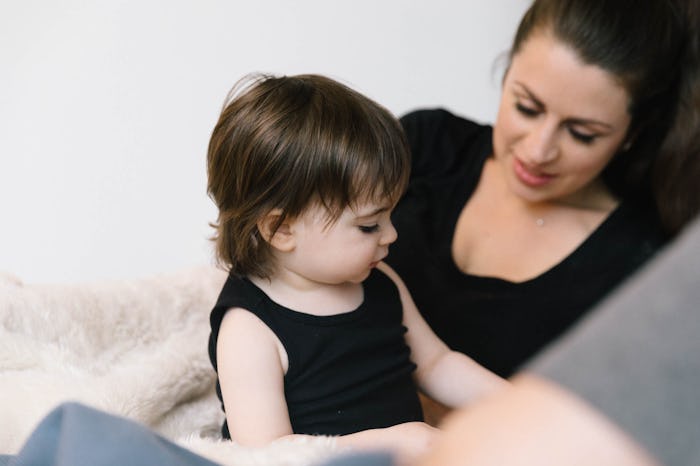Life
Here's Exactly How Toddler Memories Work & What They, Surprisingly, *Really* Remember
The minds of our children are fascinating, and I'm sure I'm not the only parent who has been taken aback by her toddler remembering things I never thought he would. Yet at the same time, they're not exactly elephants. I'm assuming I'm also not the only parent who has to repeat the same rules or answers to questions a thousand times a day. So what do toddlers remember? How do their memories actually work and what's the rhyme or reason behind what they can and can't recall?
Early Childhood Specialist Dr. Sally Goldberg says a toddler's memory can be understood to adhere to the two basic factors that apply to all memory: Repetition and emotion. While the necessity of repetition is not surprising, the fact that it takes emotion to make an event "stick" might be a newsflash. The whole concept of memory, Goldberg says, is a complicated and complex combination of both factors together.
"Yes, every single input a baby, toddler, or 2-year-old experiences fits into the mix and is remembered by the brain at the level," she explains. "Every person is a growing product of their experiences. Experiences in early childhood are more formative than those for older children and adults because they are factored in by 'total percentage of experiences.' One experience for a little one is a much larger percent of all experiences than it is for an older child or adult."
According to Goldberg, all learning is represented by connecting synapses in the brain. The brain starts off in infancy and early childhood growing in a rapid fire learning rate — which is why it is easier to learn a second language as a toddler than as an adult, but also why trauma has a much deeper impact on a small child than on a college student; memory can be both an asset and a liability. The brain continues growing and connecting synapses over a lifetime, but the process slows drastically as we age.
"Here is the practical part," Goldberg explains. "All experiences are processed and remembered on the level that they are experienced. A baby experiences and therefore remembers anything that happens on a baby level. They remember a lot based on repetition and familiarity and emotion, but their memory expertise keeps getting more refined as they grow. After that, the brain keeps learning and growing but also continues to slow in pace. Therefore with the age and stage, remembering gets clearer, more detailed, and specific over time."
As you may recall from Psych 101, Jean Piaget, the world-renowned child developmental psychologist, conducted experiments in the field of memory with a specific focus on toddlers and infants. Health and Wellness Expert Caleb Backe notes that one of Piaget's great contributions was a groundbreaking finding that toddlers demonstrate active recall by 18 months of age. (This information is less groundbreaking to those of us with tots who find our car keys every time we hide them.)
Scientific American reported that small children do remember specific episodes of their infant years, but go on to lose them later. So if you've ever questioned the validity of your kindergartener's recall of her second birthday party, know that she likely really does remember it. Unfortunately, the memory will fade and probably be lost in a few more years.
The most important thing about your toddler's memory is not the specificity of it, but that his or her mind is literally being shaped by their everyday experiences on an emotional level. While you might be saddened to hear that Junior probably won't remember that last trip to grandma's, you can be assured that the feeling of comfort and safety he experienced there will remain with him forever.
Check out Romper's new video series, Bearing The Motherload, where disagreeing parents from different sides of an issue sit down with a mediator and talk about how to support (and not judge) each other’s parenting perspectives. New episodes air Mondays on Facebook.
